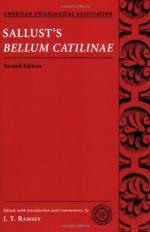|
This section contains 13,828 words (approx. 47 pages at 300 words per page) |

|
SOURCE: Levene, D. S. “Sallust's Catiline and Cato the Censor.” Classical Quarterly 50, no. 1 (January-June 2000): 170-91.
In the following essay, Levene argues that in the Bellum Catilinae Sallust was working in the tradition of Cato the Censor as he calls for moral uprightness and condemns the lack of virtue in contemporary life.
That Sallust1 owed a considerable debt to the writings of Cato the Censor was observed in antiquity,2 and the observation has often been discussed and expanded on by modern scholars.3 The ancient references to Sallust's employment of Cato are mainly in the context of his adoption of an archaic style, and specifically Catonian vocabulary. But the choice of Cato as a model had an obvious significance that went beyond the purely stylistic.4 Sallust's works articulate extreme pessimism at the moral state of late-Republican Rome, and do so partly by contrasting the modern age with a prelapsarian time...
|
This section contains 13,828 words (approx. 47 pages at 300 words per page) |

|


